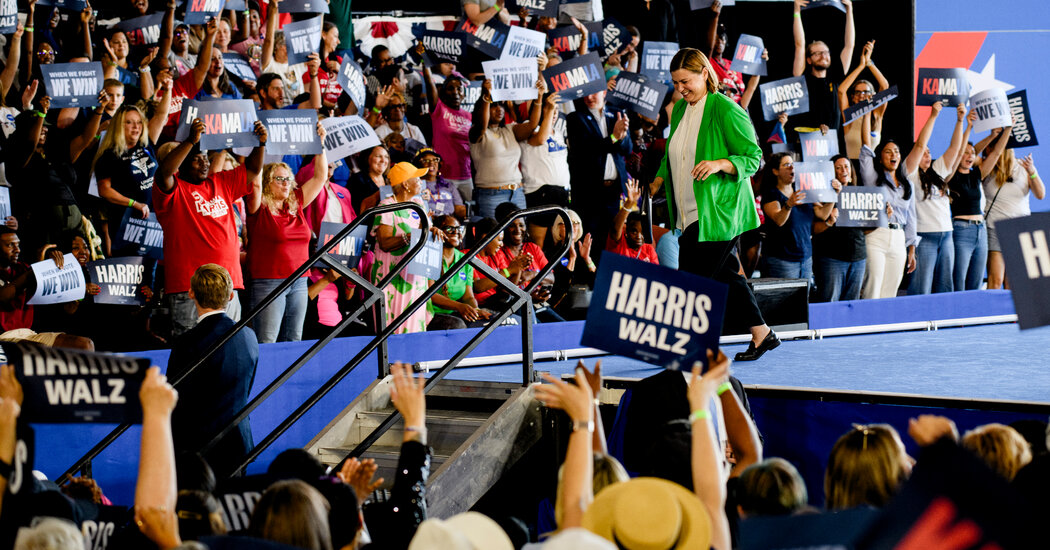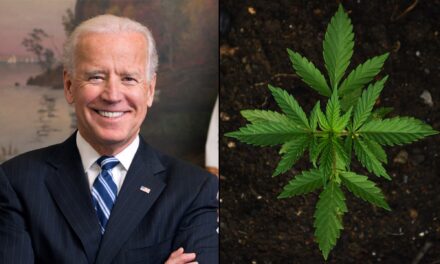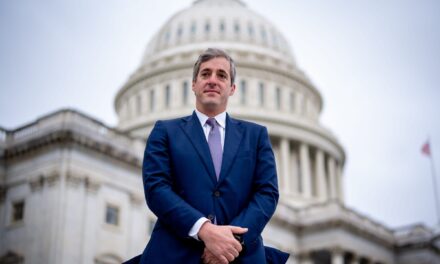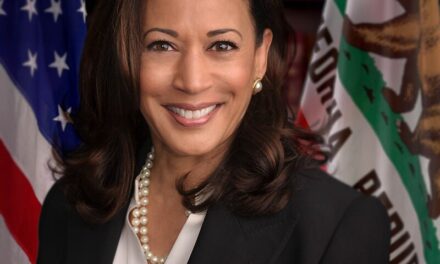
When President Biden campaigned in Michigan last month, Representative Elissa Slotkin, the Democrats’ nominee for the state’s open Senate seat, was nowhere to be found. But on Wednesday night, just weeks after that no-show, Ms. Slotkin announced her full-throated support for her party’s new presidential ticket at a Detroit rally.
Appearing in front of an estimated 15,000 people at the rally for Vice President Kamala Harris and her newly minted running mate, Gov. Tim Walz of Minnesota, Ms. Slotkin concluded her speech by delivering her final punch at the Republicans’ vice-presidential nominee, Senator JD Vance of Ohio.
“Let me just say one thing again about Midwestern values, and again you’re going to have to excuse me: No red-blooded Michigander is ever going to let a Buckeye get into the damned White House,” she said.
Ms. Slotkin is not alone in recognizing the new political landscape since Mr. Biden decided to end his re-election bid. The new energy and rapid coalescing of Democrats behind Ms. Harris and Mr. Walz have drastically changed the strategies of both Democrats and Republicans alike in down-ballot races.
Gone are the days when Democratic candidates for the House and the Senate conveniently pleaded prior engagements during visits from their standard-bearer as they quietly issued calls for him to step aside. Gone also are Republican hopes for a collapse in Democratic turnout from a demoralized base that would mean an easy Republican takeover of the Senate and a healthy expansion of the party’s narrow majority in the House.
New polling from The New York Times and Siena College shows narrow leads for Ms. Harris among likely voters in the crucial battleground states of Pennsylvania, Michigan and Wisconsin — but far bigger leads for down-ballot Democratic candidates.
In Wisconsin, Senator Tammy Baldwin leads her Republican challenger, Eric Hovde, 51 percent to 44 percent among likely voters. In Pennsylvania, Senator Bob Casey leads his rival, Dave McCormick, 51 percent to 37 percent. In Michigan, where Ms. Slotkin and her Republican opponent, former Representative Mike Rogers, won their primaries on Tuesday, the race is still fluid, with 11 percent undecided, but the Democrat begins the general election sprint with a narrow lead among likely voters, 46 percent to 43 percent.
Republicans say they are recalibrating their messages to tie House and Senate candidates to the liberal policies they hope to attach to Ms. Harris as they prepare for trench warfare over the next three months.
“The case against Joe Biden relied in part on the fact that he was mentally unfit to hold office, which was difficult to translate down-ballot,” a memo from the National Republican Senatorial Committee reads. “Kamala Harris owns the Biden Administration’s baggage and is an avowed radical. An endorsement of Kamala Harris is an endorsement of her extreme agenda, and Harris is arguably a bigger threat to Democrats’ Senate majority.”
Republican candidates appear to be embracing that message.
“Washington politicians are wasting your tax dollars on corporate welfare, and giving hotels and health care to illegals rather than making life more affordable for families,” intones a new advertisement from Mr. Rogers, Ms. Slotkin’s Republican opponent, as an image of Ms. Harris behind Mr. Biden flashes across the screen.
But Democratic exuberance, at least for now, seems to be everywhere. The huge rallies that launched the Harris-Walz ticket last week, in Philadelphia, Eau Claire, Wis., Phoenix and Las Vegas, all featured Democratic Senate candidates, many of whom had avoided Mr. Biden’s recent events in their states.
“I am so proud to be here today,” Ms. Baldwin proclaimed in Eau Claire, as she heralded “a new beginning for our party and our country.” A month before, while Mr. Biden was at a middle school in Madison, Wis., Ms. Baldwin was 180 miles away, in Marinette County.
The Harris campaign produced an array of statistics — 750,000 new supporters signed up for events, 200,000 new volunteers for 29,000 shifts knocking on doors and 197,000 shifts making phone calls, $200 million raised during the first week of the vice president’s candidacy — to show how Ms. Harris’s fortunes will benefit front-line Democrats.
And those Democrats are lapping it up. Representative Ruben Gallego, the Democrat running for Arizona’s open Senate seat, was initially tepid on the vice president when Mr. Biden stepped aside. On Friday night in Phoenix, however, he gave a speech ahead of Ms. Harris and Mr. Walz, came back on the stage to hug Ms. Harris when she was done, and then went out for Mexican food with the presidential ticket and Mr. Walz’s daughter, Hope.
But not all is well with the Democratic brand, even if the Republican nominee, former President Donald J. Trump, is in a rough patch. Senator Jacky Rosen, a Nevada Democrat locked in a tight re-election fight, appeared in Las Vegas with Ms. Harris and Mr. Walz on Saturday, declaring of Ms. Harris: “She has the grit. She has the determination. And she will win this race.” But Ms. Rosen is skipping the Democratic National Convention this month in Chicago, as will a number of House and Senate Democrats in tough contests, including Senators Sherrod Brown of Ohio and Jon Tester of Montana.
And with Ohio and Montana off the presidential map, it is not at all clear how much the new ticket will help those red-state Democrats fend off their Republican rivals.
Mr. Tester, for one, has made it clear he wants to campaign on his own — and try to burnish his independent brand. And, as one Democratic strategist said, the party is still going to need thousands of Trump-Tester and Trump-Brown voters if the Democrats have any hope of holding the Senate.
Republicans concede that a Democratic collapse is no longer in the offing, but they say they do believe the obsessive focus of voters and the media on Mr. Biden’s age had blunted their efforts to focus on issues that favor the G.O.P., like the economy, inflation and illegal immigration. Also, gone is the notion that Mr. Trump would win in a cakewalk, so voters who might have been planning to side with Democrats as a check on the White House are now up for grabs, Republican strategists say.
To get them, Republican campaigns are singularly focused on painting Ms. Harris as a “radical” leftist, and linking Democratic incumbents to her. It is the subject of advertising from Senate candidates like Bernie Moreno in Ohio, Mr. Hovde in Wisconsin and Mr. McCormick in Pennsylvania.
But even some Republicans conceded that the hoped-for shift to issues has been complicated by Mr. Trump’s attacks on Ms. Harris’s racial identity, his feuds with fellow Republicans, such as the governor of Georgia, Brian Kemp, and his flights of fancy, like his story of a near-crash helicopter flight with the former San Francisco mayor Willie Brown that never happened.
And Democrats say that, if nothing else, Ms. Harris’s rise and the thousands of Democrats who have flocked to her events have given down-ballot Democrats an audience to savage their Republican opponents, as Mr. Casey did in Philadelphia on Tuesday.
Ms. Slotkin, in an interview on Thursday, compared the change in enthusiasm and optimism to a lightning strike.
“We know we can’t get caught up in the sugar high; we must win independents, it’s just math,” she said. But for now, she added, Republicans “are off their feet, and there’s no way to see it any other way.”
Democrats hoping to hold the Senate still face long odds in a year when the map is stacked against them. One Democratic seat, Senator Joe Manchin III’s in West Virginia, is all but conceded, erasing the Democrats’ current one-seat majority. In November, they will have to successfully defend every single contested Democratic seat — Michigan, Maryland, Pennsylvania, Wisconsin, Arizona, Nevada, Ohio and Montana — or snag an unlikely Republican seat in Florida, Missouri or Texas, in order to maintain control.
But without the White House, and the vice presidency to cast the tiebreaking vote, a Democratic majority was next to impossible. Now it seems at least plausible, Democrats say.
“We must we must win Pennsylvania to win the presidency, right, and we must win Pennsylvania to preserve this majority in the United States Senate,” Mr. Casey said at the Tuesday kickoff rally with Mr. Walz.
Kellen Browning and Shane Goldmacher contributed reporting from Phoenix. Nicholas Nehamas contributing reporting from Las Vegas.




